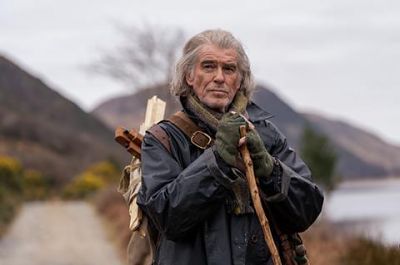
Four Letters of Love
Click here if you liked this article 5 ![]()
https://www.palacecinemas.com.au/movies/four-letters-of-love
Date Reviewed: 09/08/2025
The film is based on a novel of the same name, and the author (Niall Williams) was directly involved in the adaptation of the book to film. It is my first experience of a film directed by Polly Steele, known for her focus on emotionally sensitive stories.
Opening with a haunting Celtic melody drifting over a rippling sea, the film establishes a contemplative tone from the outset. Set against the windswept beauty of 1970s rural Ireland, it unfolds as a poignant tale of love, destiny, and the enduring belief in divine providence.
Narrated by Nicholas (Fionn O’Shea), a reflective young writer, the film introduces a tapestry of characters, relationships, and plot threads, interweaving flashbacks and parallel storylines that hint at deeper currents.
William (Pierce Brosnan) is the father of Nicholas. Tethered to his desk, as a conservative civil servant, William experiences a profound calling to become a painter. He abandons home for the mystical west, “where the paintings would come,” and reemerges as a wild and woolly artist driven by a singular, almost spiritual purpose.
William’s departure leaves Nicholas grappling. In search of connection and identity, Nicholas follows his father into the physical wilderness. Of his journey, Nicholas observes, “I carry more than just the painting.”
In parallel, Isabel (Ann Skelly) spends carefree days frolicking in the fields with her beloved brother Sean (Donal Finn), until he is suddenly incapacitated by a tragic accident and Isabel’s world shifts.
Isabel’s parents are Margaret (Helena Bonham-Carter) and Muiris (Gabriel Byrne). Muiris has an artist’s temperament (sensitive, introspective, and prone to poetic despair), while Margaret is feisty and resolute. “Don’t you dare strike him,” she retorts to the heavens, dragging Muiris away from his anguished plea to be “taken” in exchange for his son’s healing.
Following Sean’s accident. Isabel’s parents send Isabel to a convent school, where it is immediately clear Isabel won’t belong. Until now, the film’s palette has been muted, steeped in subdued browns and greys. Then, in a promise of release, Peader (Ferdia Walsh-Peelo) appears in a vivid flame-coloured car as Isabel just as Isabel scales the school’s gate in a desperate bid for freedom. From this charged moment, their relationship begins to unfold.
It was at this point that I wondered how and when Nicholas and Isabel would cross paths. The film offers frequent glimpses of ferry and bus rides to and from the island. Finally, a link of proximity is established, although the two do not interact. When they do eventually meet, it is through the unexpected convergence of their fathers’ artistic practices. But this moment is best left for viewers to discover on their own.
So did I enjoy this film? The characters were well played, and the setting was undeniably beautiful. The narrative had depth, and the ‘destined lovers’ theme was handled with care. But the ghosts, divine interventions, and miracles tipped the scale a little too far for me, so that poetic fantasy veered into soap opera territory and diluted some of the emotional resonance.
Reviewed by Sharon Stockwell